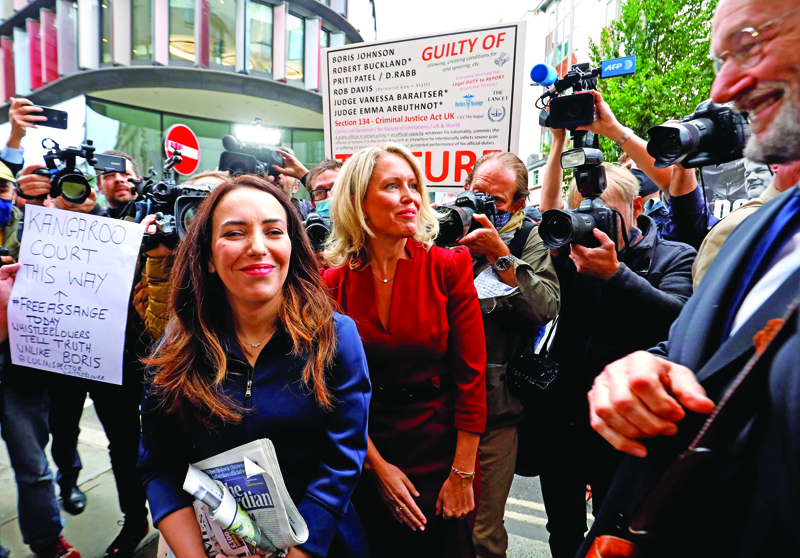
LONDON: Supporters of Julian Assange yesterday protested outside a London courtroom, calling for the WikiLeaks founder not to be extradited to the United States for leaking secrets about the wars in Iraq and Afghanistan. Many brandished placards reading "Don't Extradite Assange" and "Journalism is not a crime!", as the 49-year-old Australian was brought to the Old Bailey for the resumed hearing. Fashion designer Vivienne Westwood joined protesters and said the former hacker was "shining the light on all the corruption in the world".
Earlier, Assange's partner, Stella Moris, delivered an 80,000-strong petition opposing his extradition to Prime Minister Boris Johnson's Downing Street office. In an interview published in The Times newspaper on Saturday, Moris, 37, said: "For Julian, extradition will be a death sentence." She said she feared he would take his own life, and their two young sons, who were conceived during his asylum in Ecuador's London embassy, would grow up without a father.
Assange appeared in the dock wearing a dark suit and maroon tie-the first time he has been seen in public since the first part of the hearing in February. He spoke to confirm his name and date of birth, and said he did consent to extradition. The Old Bailey hearing-due to last three to four weeks-had been set to go ahead in April but was delayed by the coronavirus outbreak. Assange faces 18 charges under the US Espionage Act for the 2010 release of 500,000 secret files detailing aspects of US military campaigns in Afghanistan and Iraq.
Washington claims he helped intelligence analyst Chelsea Manning to steal the documents before recklessly exposing confidential sources around the world. If convicted, he could be jailed for up to 175 years. Any ruling in favor of extradition is "almost certain" to be appealed by the losing side, according to John Rees, of the Don't Extradite Assange Campaign. Assange-who has become a figurehead for press freedom and investigative journalism-had a "very strong defense", Rees added. But he was concerned the case had become "highly politicized". A previous hearing was told that US President Donald Trump promised a pardon if Assange denied Russia leaked emails from the campaign of his 2016 election opponent Hillary Clinton.
Frail
At the February hearing, Assange's lawyer, Edward Fitzgerald, said his client would not get a fair trial in the United States and would be a suicide risk. James Lewis, representing the US government, said WikiLeaks was responsible for "one of the largest compromises of classified information in the history of the United States". "Reporting or journalism is not an excuse for criminal activities or a license to break ordinary criminal laws," he added.
Assange appeared weak and confused during his February court appearance, apparently forgetting his date of birth. He also told district judge Vanessa Baraitser he had not understood what had happened in the hearing. His legal team has repeatedly warned about his health, including from the spread of Covid-19, and an independent UN rights expert said in November that his continued detention at a high-security prison was putting his life at risk. Meanwhile, the Council of Europe rights group warned that Assange's extradition would have a "chilling effect" on press freedom.
Long-running saga
The saga began in 2010 when Assange faced allegations of sexual assault and rape in Sweden, which he denied. He was in Britain at the time but dodged an attempt to extradite him to Sweden by claiming political asylum in Ecuador's embassy in London. For seven years he lived in a small apartment in the embassy, but after a change of government in Quito, Ecuador lost patience with its guest and turned him over to British police in April 2019. Swedish prosecutors confirmed last year they had dropped the rape investigation, saying that despite a "credible" account from the alleged victim there was insufficient evidence to proceed.- AFP
.jpg)
![CORRECTION - Stella Moris (L), the partner Wikileaks founder Julian Assange, arrives with his father John Shipton (R) and Australian human rights lawyer Jennifer Robinson, at the Old Bailey court in central London on September 7, 2020, for Assange's extradition hearing. - A London hearing resumes on Monday to decide if WikiLeaks founder Julian Assange should be extradited to the United States to face trial over the publication of secrets relating to the wars in Afghanistan and Iraq. The 49-year-old Australian, who is currently being held on remand at a high-security jail, faces 18 counts from US prosecutors that could see him jailed for up to 175 years. (Photo by Tolga Akmen / AFP) / CORRECTING SPELLINGnìThe erroneous mention[s] appearing in the metadata of this photo by Tolga Akmen has been modified in AFP systems in the following manner: [Stella Morris] instead of [Stella Moris]. Please immediately remove the erroneous mention[s] from all your online services and delete it (them) from your servers. If you have been authorized by AFP to distribute it (them) to third parties, please ensure that the same actions are carried out by them. Failure to promptly comply with these instructions will entail liability on your part for any continued or post notification usage. Therefore we thank you very much for all your attention and prompt action. We are sorry for the inconvenience this notification may cause and remain at your disposal for any further information you may require.î](/theme_kuwaittimes/images/no-image.png)